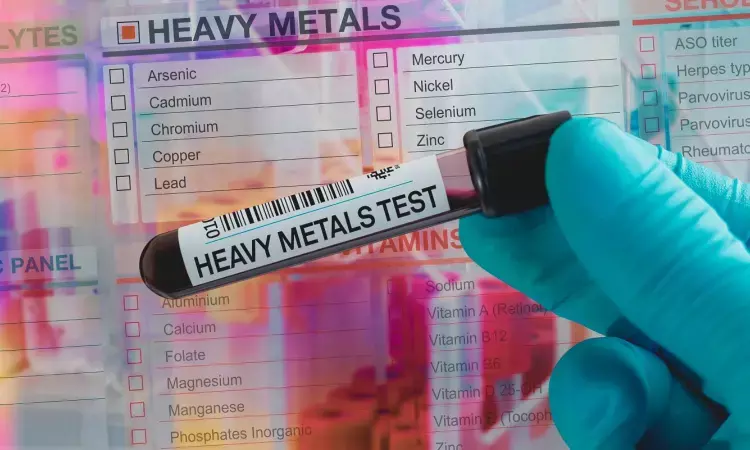- Home
- Medical news & Guidelines
- Anesthesiology
- Cardiology and CTVS
- Critical Care
- Dentistry
- Dermatology
- Diabetes and Endocrinology
- ENT
- Gastroenterology
- Medicine
- Nephrology
- Neurology
- Obstretics-Gynaecology
- Oncology
- Ophthalmology
- Orthopaedics
- Pediatrics-Neonatology
- Psychiatry
- Pulmonology
- Radiology
- Surgery
- Urology
- Laboratory Medicine
- Diet
- Nursing
- Paramedical
- Physiotherapy
- Health news
- Fact Check
- Bone Health Fact Check
- Brain Health Fact Check
- Cancer Related Fact Check
- Child Care Fact Check
- Dental and oral health fact check
- Diabetes and metabolic health fact check
- Diet and Nutrition Fact Check
- Eye and ENT Care Fact Check
- Fitness fact check
- Gut health fact check
- Heart health fact check
- Kidney health fact check
- Medical education fact check
- Men's health fact check
- Respiratory fact check
- Skin and hair care fact check
- Vaccine and Immunization fact check
- Women's health fact check
- AYUSH
- State News
- Andaman and Nicobar Islands
- Andhra Pradesh
- Arunachal Pradesh
- Assam
- Bihar
- Chandigarh
- Chattisgarh
- Dadra and Nagar Haveli
- Daman and Diu
- Delhi
- Goa
- Gujarat
- Haryana
- Himachal Pradesh
- Jammu & Kashmir
- Jharkhand
- Karnataka
- Kerala
- Ladakh
- Lakshadweep
- Madhya Pradesh
- Maharashtra
- Manipur
- Meghalaya
- Mizoram
- Nagaland
- Odisha
- Puducherry
- Punjab
- Rajasthan
- Sikkim
- Tamil Nadu
- Telangana
- Tripura
- Uttar Pradesh
- Uttrakhand
- West Bengal
- Medical Education
- Industry
EDTA Chelation Cuts Blood Lead Levels by 61 Percent in Diabetes and MI Patients, but Fails to Prevent MACE: TACT2 Trial

USA: In a recent study, the TACT2 randomized clinical trial has unveiled promising results for edetate disodium-based chelation therapy in patients with a history of myocardial infarction (MI) and diabetes. The trial, which explored the efficacy of this treatment in improving cardiovascular outcomes, offers new hope for managing these high-risk patients.
The study, published in JAMA, revealed that EDTA-based chelation decreased median blood lead levels by 61% from baseline in patients with diabetes and prior MI, however, it failed to reduce major adverse cardiovascular events (MACEs).
Chelation therapy, which involves the administration of a chelating agent to remove heavy metals from the body, has been used in various medical treatments for decades. Edetate Disodium, one such agent, has been studied for its potential benefits in reducing cardiovascular events. In 2013, the Trial to Assess Chelation Therapy (TACT) demonstrated that EDTA-based chelation therapy led to an 18% reduction in cardiovascular disease (CVD) events among 1,708 patients with a history of myocardial infarction.
Against the above background, Gervasio A. Lamas, Columbia University Division of Cardiology, Mount Sinai Medical Center, Miami Beach, Florida, and colleagues aimed to replicate the finding of TACT in individuals with diabetes and previous MI.
A multicenter trial across 88 sites in the US and Canada, designed as a 2 × 2 factorial, double-masked, placebo-controlled study, involved participants aged 50 or older who had diabetes and had experienced an MI at least six weeks prior. The trial compared the effects of EDTA-based chelation infusions versus placebo infusions, as well as high doses of oral multivitamins and minerals versus placebo on CVD events.
Participants were randomly assigned to receive either 40 weekly infusions of an EDTA-based chelation solution or a matching placebo, alongside twice-daily doses of high-dose multivitamins and minerals or a placebo, over 60 months. This article specifically focuses on the comparison between chelation and placebo infusions.
The primary outcome measured was a composite of all-cause mortality, MI, stroke, coronary revascularization, or hospitalization for unstable angina, with a median follow-up duration of 48 months. The analysis was based on patients who received at least one assigned infusion.
The following were the key findings of the study:
- Of the 959 participants (median age, 67 years; 27% females), 483 received at least one chelation infusion and 476 at least one placebo infusion.
- A primary endpoint event occurred in 35.6% of participants in the chelation group and 35.7% in the placebo group (adjusted hazard ratio [HR], 0.93).
- The 5-year primary event cumulative incidence rates were 45.8% for the chelation group and 46.5% for the placebo group.
- CV death, MI, or stroke events occurred in 18.4% of participants in the chelation group and 19.7% in the placebo group (adjusted HR, 0.89).
- Death from any cause occurred in 17.4% of participants in the chelation group and 17.6% in the placebo group (adjusted HR, 0.96).
- Chelation reduced median blood lead levels from 9.03 μg/L at baseline to 3.46 μg/L at infusion 40. Corresponding levels in the placebo group were 9.3 μg/L and 8.7 μg/L, respectively.
"Although EDTA chelation successfully lowered blood lead levels, it did not reduce cardiovascular events in stable patients with coronary artery disease who also had diabetes and a history of myocardial infarction," the researchers concluded.
Reference:
Lamas GA, Anstrom KJ, Navas-Acien A, et al. Edetate Disodium–Based Chelation for Patients With a Previous Myocardial Infarction and Diabetes: TACT2 Randomized Clinical Trial. JAMA. Published online August 14, 2024. doi:10.1001/jama.2024.11463
Dr Kamal Kant Kohli-MBBS, DTCD- a chest specialist with more than 30 years of practice and a flair for writing clinical articles, Dr Kamal Kant Kohli joined Medical Dialogues as a Chief Editor of Medical News. Besides writing articles, as an editor, he proofreads and verifies all the medical content published on Medical Dialogues including those coming from journals, studies,medical conferences,guidelines etc. Email: drkohli@medicaldialogues.in. Contact no. 011-43720751


